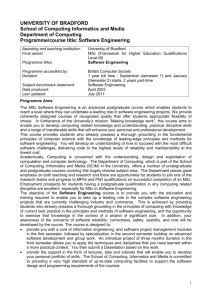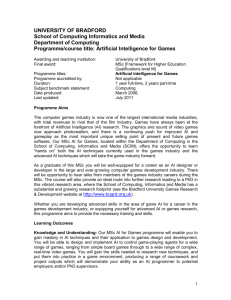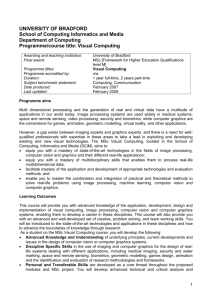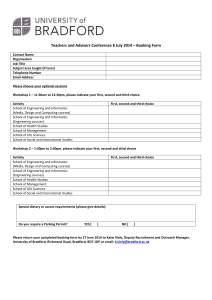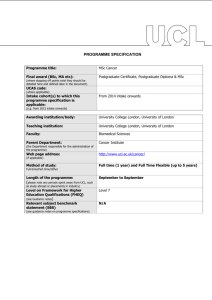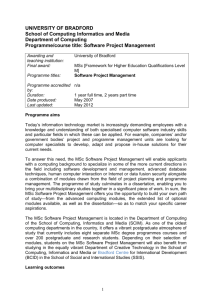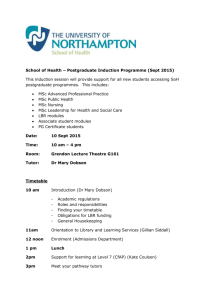MSc Mobile Computing
advertisement
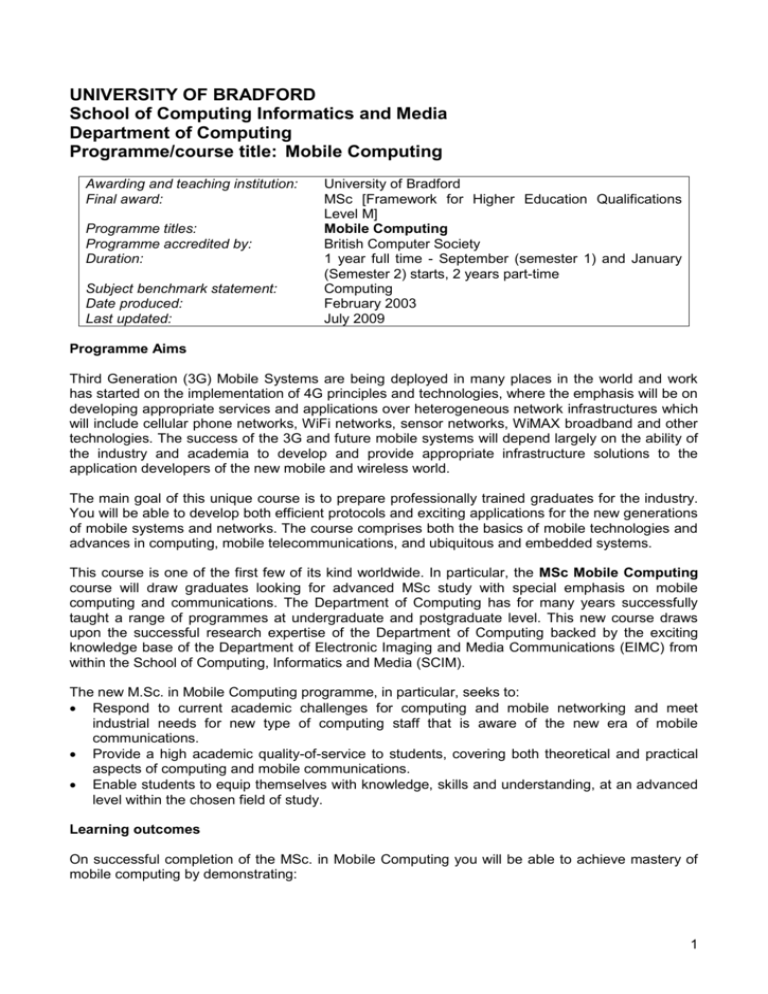
UNIVERSITY OF BRADFORD School of Computing Informatics and Media Department of Computing Programme/course title: Mobile Computing Awarding and teaching institution: Final award: Programme titles: Programme accredited by: Duration: Subject benchmark statement: Date produced: Last updated: University of Bradford MSc [Framework for Higher Education Qualifications Level M] Mobile Computing British Computer Society 1 year full time - September (semester 1) and January (Semester 2) starts, 2 years part-time Computing February 2003 July 2009 Programme Aims Third Generation (3G) Mobile Systems are being deployed in many places in the world and work has started on the implementation of 4G principles and technologies, where the emphasis will be on developing appropriate services and applications over heterogeneous network infrastructures which will include cellular phone networks, WiFi networks, sensor networks, WiMAX broadband and other technologies. The success of the 3G and future mobile systems will depend largely on the ability of the industry and academia to develop and provide appropriate infrastructure solutions to the application developers of the new mobile and wireless world. The main goal of this unique course is to prepare professionally trained graduates for the industry. You will be able to develop both efficient protocols and exciting applications for the new generations of mobile systems and networks. The course comprises both the basics of mobile technologies and advances in computing, mobile telecommunications, and ubiquitous and embedded systems. This course is one of the first few of its kind worldwide. In particular, the MSc Mobile Computing course will draw graduates looking for advanced MSc study with special emphasis on mobile computing and communications. The Department of Computing has for many years successfully taught a range of programmes at undergraduate and postgraduate level. This new course draws upon the successful research expertise of the Department of Computing backed by the exciting knowledge base of the Department of Electronic Imaging and Media Communications (EIMC) from within the School of Computing, Informatics and Media (SCIM). The new M.Sc. in Mobile Computing programme, in particular, seeks to: Respond to current academic challenges for computing and mobile networking and meet industrial needs for new type of computing staff that is aware of the new era of mobile communications. Provide a high academic quality-of-service to students, covering both theoretical and practical aspects of computing and mobile communications. Enable students to equip themselves with knowledge, skills and understanding, at an advanced level within the chosen field of study. Learning outcomes On successful completion of the MSc. in Mobile Computing you will be able to achieve mastery of mobile computing by demonstrating: 1 Systematic Knowledge and Understanding and a critical awareness at advanced level, of core computing and networking subjects including computer and networking architectures, detailed understanding of the differences between traditional computing and mobile computing through recognition of the influence of mobility on protocol design and evaluation, and application development over mobile environments; a comprehensive understanding of techniques applicable to research in mobile computing and networks; Discipline Specific Skills, showing: originality in the application of knowledge, together with a practical understanding of how established techniques of research and enquiry in Mobile Computing are used to create and interpret knowledge in the discipline; the ability to design, implement, and evaluate mobile applications; Personal and Transferable Skills necessary for employment requiring: the exercise of initiative and personal responsibility; decision-making in complex and unpredictable situations; and the independent learning ability required for continuing professional development. The Curriculum The MSc Mobile Computing covers a range of specialist topics, leading to the qualification of a Master's degree. Typically, a taught full-time Master's course lasts for twelve months of full-time study. The course has two stages: the taught courses stage which takes place during the first two semesters (or four semesters for the part-time route), and the project/dissertation stage. The taught courses stage is organised on a modular basis. Students who successfully complete the taught modules are eligible for the PGDip Mobile Computing. Students proceeding onto the Masters level undertake a project which the student has to agree with the Department during the first taught semesters. The course is structured in terms of Core and Option modules. The relevance of the course’s content to the stated teaching aims and objectives is based on existing core computer science and networking topics as well as new modules on the simulation, design and implementation of mobile protocols and applications taking into account the limitations imposed by the terminal technologies and the mobility. You will have opportunity to enhance Personal Transferable skills principally through participation in project work. Students are invited to research seminars based on the latest research work in the field, and in particular, recent research carried out by the University’s Mobile Computing and Networks Research Group and the Networking and Performance Engineering Research Group, Dept. of Computing, School of Computing, Informatics and Media. Typically for a taught Masters programme, the course lasts for 12 months of full-time study (two semesters of instruction through a series of modules all of which are integrated to form a complete and coherent course of study, followed by completion of a major dissertation project in the summer) or 24 months of part-time study following a similar pattern. For the full-time version, the first two semesters provide the taught course material supported by extensive laboratory exercises. The final semester allows you the opportunity to develop, through sustained major project work, advanced knowledge and understanding of mobile computing. Note that, for September (semester 1) start students, the full-time programme periods are September to January, January to May, and May to September. For January (semester 2) start students, the full-time programme periods are January to May, September to January, and January to May. The full-time programme is structured to normally take one academic year as shown in the table(s) below. There are taught modules for 60 credits during semesters 1 and 2. From these, optional modules across semesters 1 & 2 may be chosen as detailed below. These should normally be level M modules, but students may select up to 20 credits of level 3 modules if appropriate. 2 Course Structure for September (semester 1) start only: Code Module title lev sem cr Notes CM1066D Networks and Protocols M 1 20 C CM0602D Networks Performance Modelling and Analysis M 1 20 C CM1067D Mobile Applications M 1 20 C CM054D Advanced Simulation Modelling (PG) M 2 20 C CM1009D Real Time Systems (PG) M 2 20 O CM1044D AI with Applications M 2 20 O CM1068D Reliability Modelling and Analysis M 2 20 O CM0424Z Dissertation M DISS 60 C Course Structure for January (semester 2) start only: Code Module title lev sem cr Notes CM1054D Advanced Simulation Modelling (PG) M 2 20 C CM1009D Real Time Systems (PG) M 2 20 O CM1068D Reliability Modelling and Analysis M 2 20 O CM1044D Artificial Intelligence with Applications M 2 20 O CM1066D Networks and Protocols M 1 20 C CM1067D Mobile Applications M 1 20 C CM0602D Network Performance Modelling and Analysis M 1 20 C CM0424Z Dissertation M DISS 60 C The curriculum may change, subject to the University's course approval, monitoring and review procedures. Assessment regulations: a summary To be eligible for a Postgraduate Diploma award you must achieve at least 40% in 100 credits and at least 35% in the other 20 credits relating to the modules taken in semesters 1 and 2. Students who attain an overall average of at least 60% in the initial attempt will be eligible for the award of Postgraduate Diploma with Merit. Additionally, students who attain an overall average of at least 70% in the initial attempt will be eligible for the award of Postgraduate Diploma with Distinction. To be eligible for an MSc Degree you must achieve at least 40% in 100 credits and at least 35% in the other 20 credits taken in semesters 1 and 2 and achieve at least 40% in the project (Dissertation). Students who attain an overall weighted average of at least 60% at the initial attempt, including at least 60% at the initial attempt in the project shall be eligible for the award of the Degree 3 of MSc with Merit. Students who attain an overall average of 70% in the units concerned at the initial attempt, including at least 70% in the project, will be eligible for the award of Msc with Distinction. Comprehensive information about the University of Bradford’s Regulation Governing Postgraduate Taught Courses is available on the web at http://www.brad.ac.uk/admin/acsec/QA_Hbk/Postgrad_Taught_Regs.html Teaching, learning and assessment strategies The programme offers a curriculum with a good balance between core elements and options. Project work further enriches the opportunities you have to take control of your own learning. A range of teaching and learning methods is employed including lectures, tutorials, laboratory work and directed private study. Each 10-credit module on the course requires you to commit 100 hours of study. Some of these hours will be formally timetabled - lectures, laboratories, seminars, tutorials and workshops – and others will involve you in carrying out private study. The course is supported by laboratories with up to date hardware and software with regular update and replacement cycles. The University’s J.B. Priestley Library contains course-relevant textbooks and journals, and the School of Computing, Informatics and Media’ computer laboratory provision is supplemented by the University’s Computer Centre. Admission Criteria The procedures, criteria and regulations for admission, including promotion of wider access and equal opportunities will follow those established for the existing PG offered by the Computing Department. Normally, evidence will be sought of successful completion of UG Honours degrees (normally 2:2 or above) containing significant proportions of Computing or Engineering as a prerequisite for acceptance on the MSc in Mobile Computing programme. Candidates applying to the course with non-standard qualifications will be judged on an individual basis using the University's APEL procedures. In addition, a test of written and spoken English normally needs to have been passed at grade 6.0 for IELTS or 550 for TOEFL (or 250 for the computer-based test). Student Support and Guidance All students admitted to the School of Computing, Informatics and Media go through a process of induction that includes detailed talks by the Dean and Head of Department. Afterwards, ongoing support for students is provided in the form of one-stop facilities located at the School of Computing, Informatics and Media Student Support Office (SSO), open throughout the day during term, and in the mornings and afternoons outside term. Support for registered students also is provided 24/7 via the intranets of the School of Computing, Informatics and Media, Department of Computing and the School’s Technical Support. The School also uses the University’s Virtual Learning Environment (VLE) known as Blackboard to support students via their individual modules. All students on our Postgraduate Programmes will be allocated a personal tutor who provides support and guidance on matters relating to learning, teaching, and academic progress. There are tutors in the School who deal with issues where other social factors (relating to gender or disability for example) may impact on a student’s academic performance. The Staff Student Liaison Committee gives the opportunity for students to give formal feedback to the Course Tutor and/or department about curricular and/or general issues in the running of the programme. Further Information More details about our MSc Mobile Computing may be obtained from the School of Computing, Informatics and Media Admissions Office via telephone on +44 (0)1274 235963, email pgadmissions@bradford.ac.uk, or our website at http://www.inf.brad.ac.uk/courses/pg/ If you require 4 further information about the University of Bradford, please refer to its Postgraduate Prospectus. The university web site can be accessed at http://www.brad.ac.uk Further information on degree opportunities available at the School of Computing, Informatics and Media can be found on http://www.inf.brad.ac.uk/ and, similarly, further information on courses available at the Department of Computing can be found at http://www.comp.brad.ac.uk/ Disclaimer The details of this Programme Specification and information contained therein are subject to change in accordance with the University of Bradford’s course approval, monitoring and review procedures. 5

